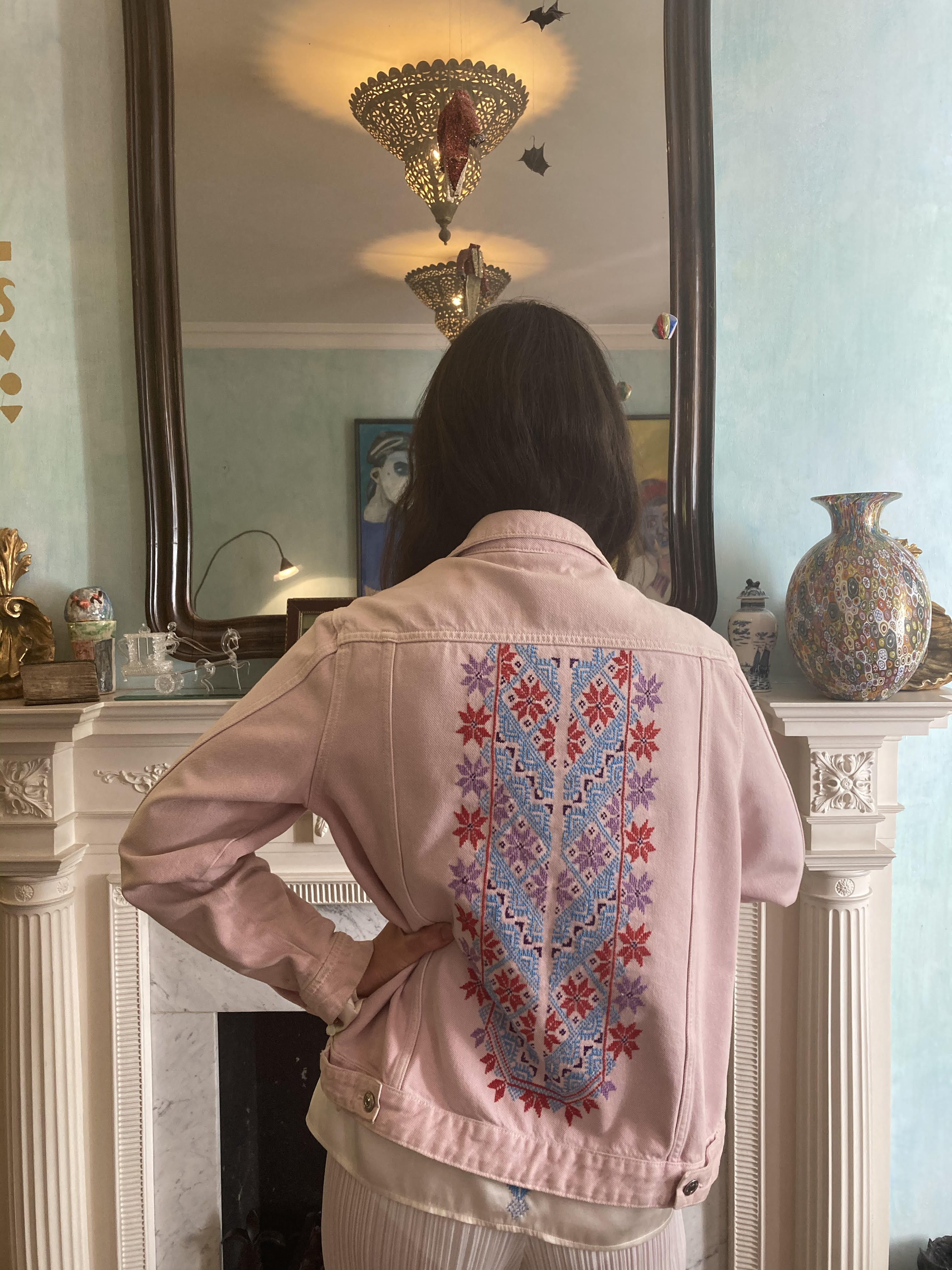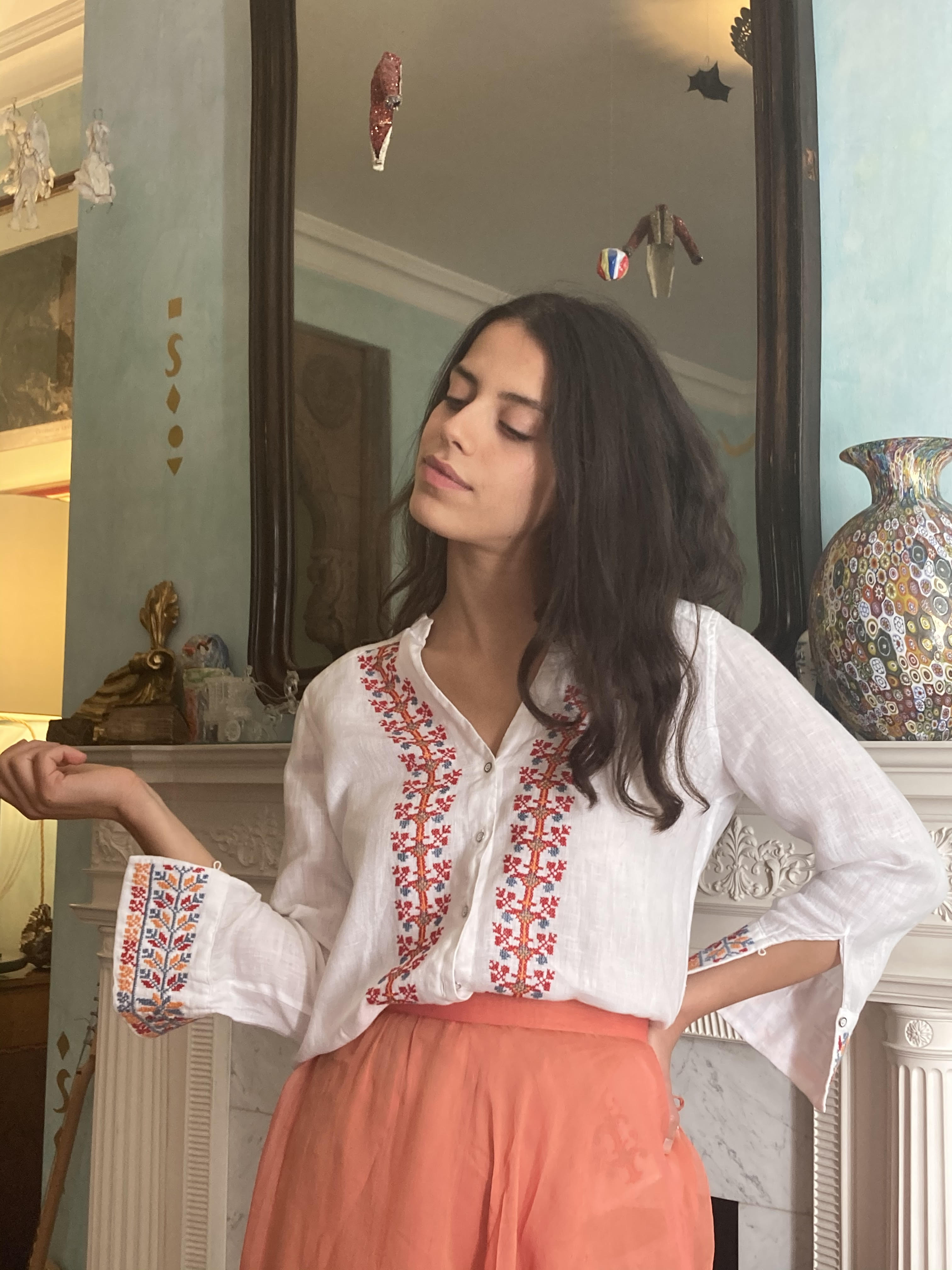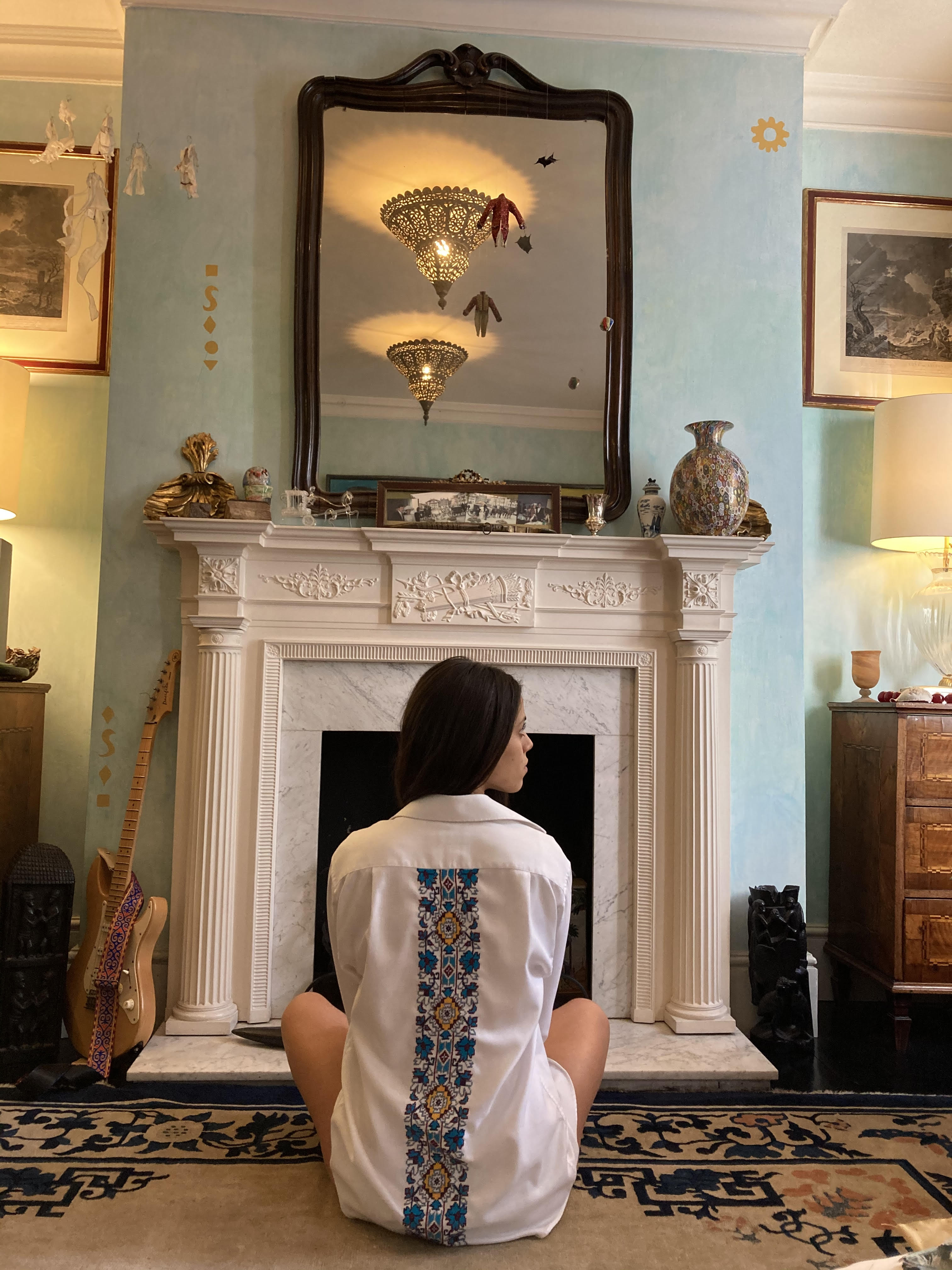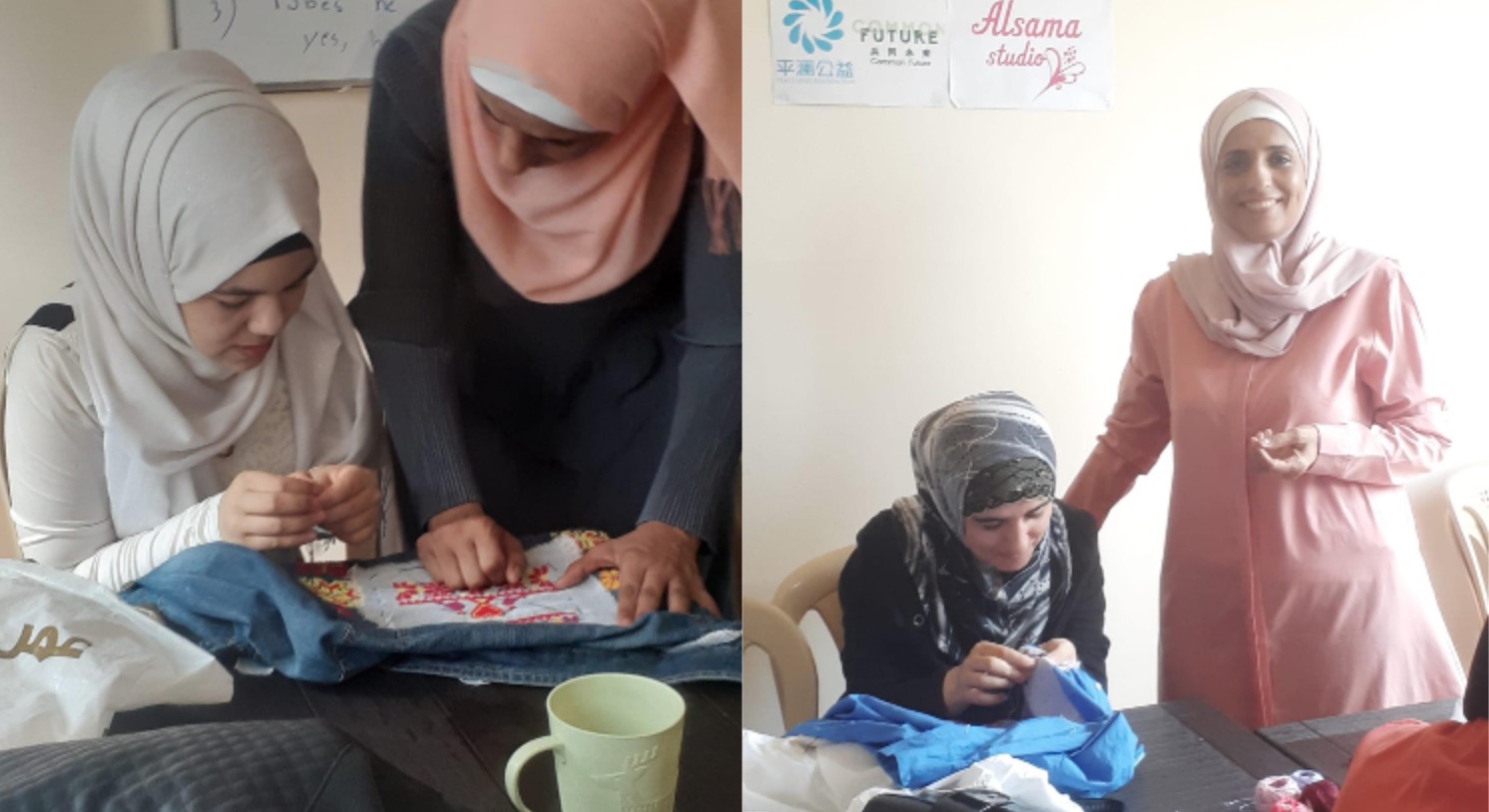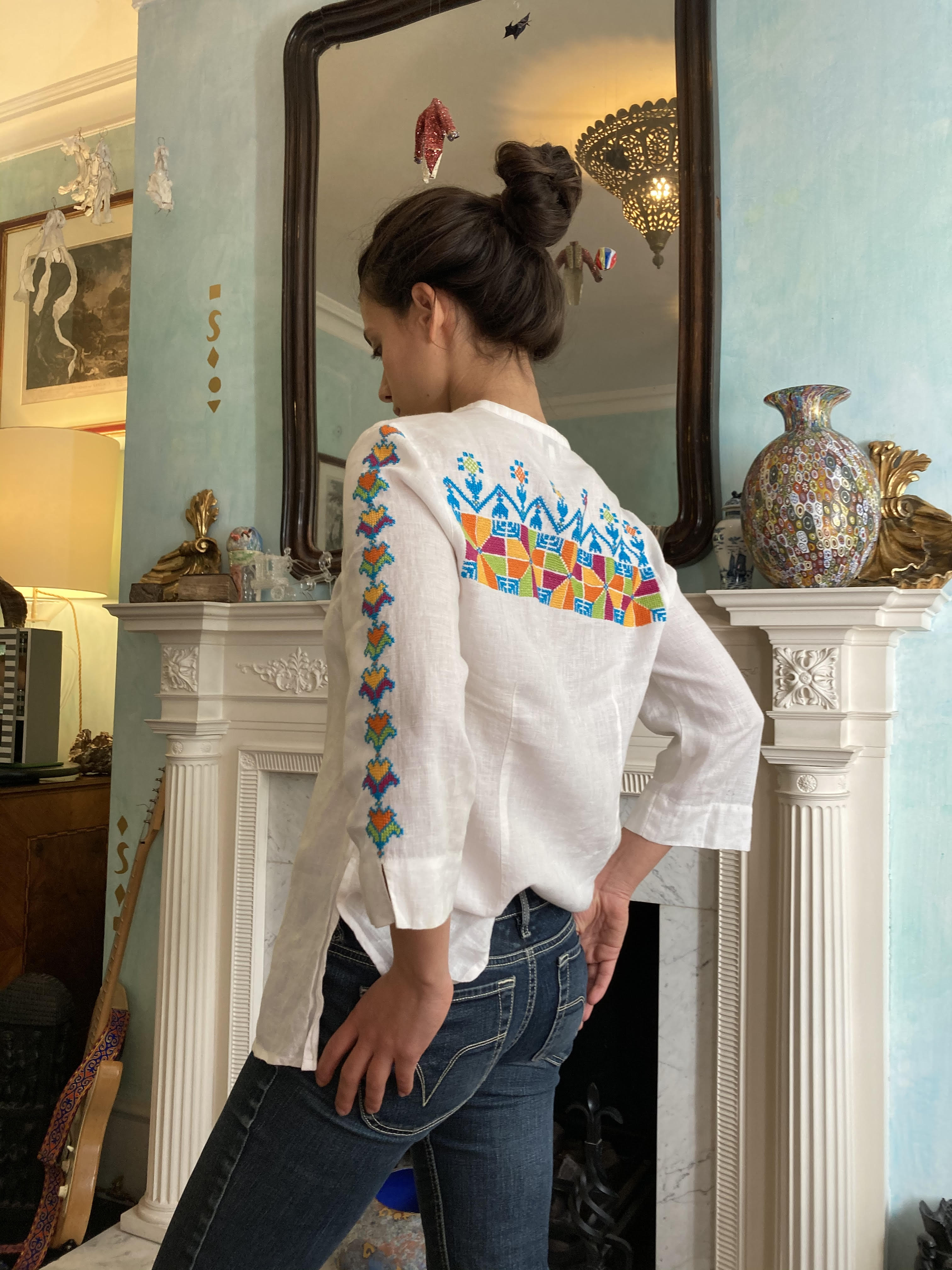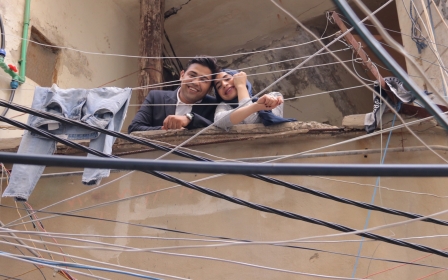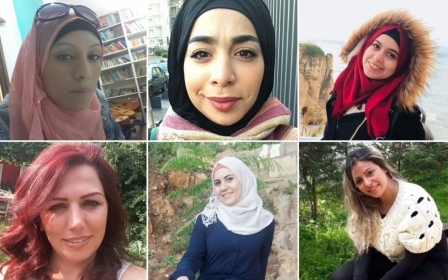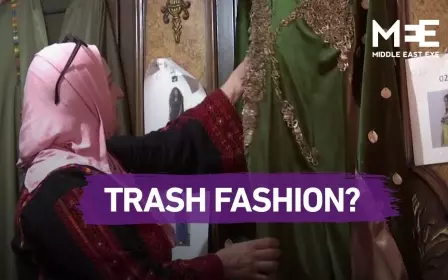Sacred threads: Fashion meets traditional embroidery in Lebanon's refugee camps
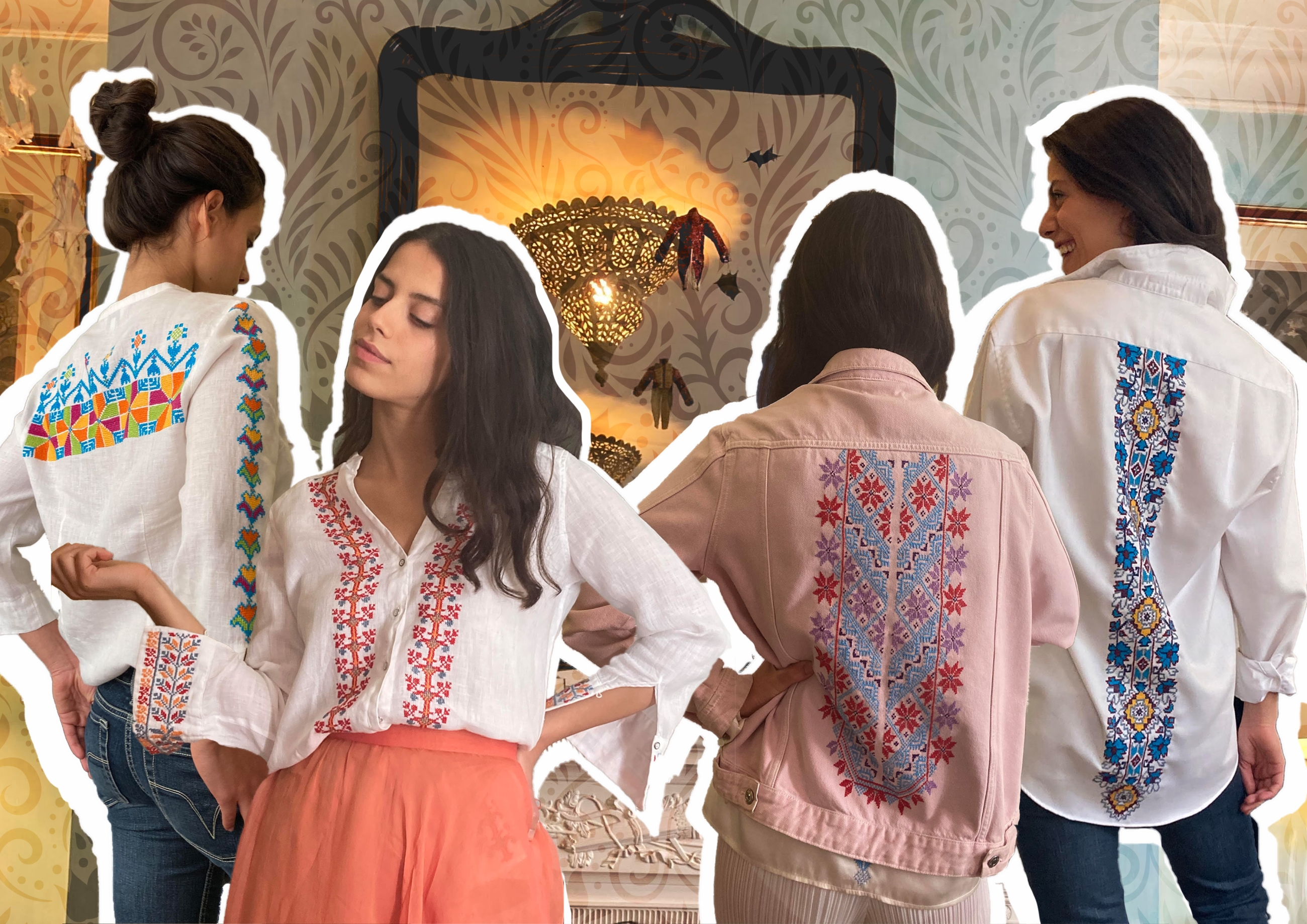
In a small studio in the heart of Beirut's crowded Bourj al-Barajneh camp, more than two dozen women from the Al Sama NGO crouch over their whirring sewing machines, embroidering clothes destined for a global market, as part of a new collaboration with British-Swiss fashion designer Larissa Von Planta.
The worsening economic situation in Lebanon and the loss in value of the currency has left many of the women working in the camp unable to earn a sustainable living income.
'I thought, what was the simplest, easiest immediate thing that we can do? Because something needs to be done now - and that’s how the idea came about'
- Larissa Von Planta, designer
Threads, canvasses and resources used to embroider textiles were imported in dollars, while the women were paid in Lebanese lira, often leaving them struggling to make ends meet. The rising price of everyday goods in the country also meant there was a loss in the market and less people buying locally handcrafted clothes.
Life only got tougher following the explosion at Beirut's port in August, which left over 200 people dead and put pressure on an already faltering economy, leading to a further spike in prices.
For Von Planta, a designer who has worked with renowned fashion houses and exhibited around the world, from Shanghai to Sao Paulo, the idea of working with a local charity was born out of her feelings of helplessness and devastation as she watched the situation unfold in Beirut following the blast.
New MEE newsletter: Jerusalem Dispatch
Sign up to get the latest insights and analysis on Israel-Palestine, alongside Turkey Unpacked and other MEE newsletters
“After the explosion I felt totally shell-shocked,” says Von Planta. “I just wanted to go back to hug my friends and that was it. I thought, what was the simplest, easiest immediate thing that we can do? Because something needs to be done now - and that’s how the idea came about.”
Von Planta had lived in Beirut for three years, working at her own atelier turning pre-loved clothes and fabric into contemporary couture, before eventually growing frustrated with the economic crisis and heading back to London.
But as news of the blast dominated the headlines and huge swathes of the city she loved were reduced to rubble, Von Planta reached out to Meike Ziervogel, CEO of the Al Sama project, a Lebanese charity that supports people living in the country's refugee camps.
In addition to the studio’s work in setting up education centres, sports events and social enterprises for refugee women, their fashion arm, Al Sama studio, also creates bespoke embroidery art and makes its own collections, upcycling fabric and old clothes.
The studio was set up as an independent enterprise at the end of 2019, and joined forces with Al Sama in 2020. Many of the women working at the studio are the sole breadwinners of their extended families and have only received a rudimentary school education, with some unable to read or write.
Von Planta decided to use her skills in traditional Middle Eastern design and embroidery to work with Al Sama on a project that would help women living in the Shatila and Bourj al-Barajneh refugee camps on the outskirts of Beirut, find new sources of income.
In the camps
The Shatila camp, which is home to the Al Sama centre, was originally established as a temporary refuge for Palestinians forcefully displaced during the establishment of Israel in 1948, also known as the Nakba, or “catastrophe”.
After the infamous 1982 Sabra and Shatila massacre, when up to 3,000 people were killed by Lebanese Phalangist militia backed by Israeli troops, the camp’s population grew. It has since become home to thousands of Syrian refugees. Some local NGOs estimate that the Shatila camp is now home to more than 42,000 people.
For Von Planta, the collaboration with Al Sama would be an opportunity to bring together her love for Beirut and good quality craftsmanship, skills she believes she inherited from her grandparents, who worked in textiles.
Ziervogel and Von Planta joined together to brainstorm ways in which they could create a project that would provide relief for refugees affected by the blast amidst the crippling economic crisis, and at the same time help empower the women in the Shatila camp.
'I’m very anti "fast fashion". It distorts our view of how cheap things should be and the notion of the value of the clothing, and the hands that are behind it' -
Larissa Von Planta, designer
They eventually came up with a plan to produce bespoke pieces, hand-stitched by women refugees working with Al Sama, to build livelihoods and distribute traditional Lebanese designs.
Customers from around the world can send an item of pre-owned clothing to Von Planta, along with 100 dollars to cover the costs of shipping, materials and income for the women working on the project. Von Planta then posts the items to the Bourj al-Barajneh camp, where the women working in the studio assess the article of clothing and design a suitable embroidery pattern.
Once complete, the women send the item back to London where it is shipped out to customers. The cost is calculated based on the number of square metres embroidered, as well as the cost of the threads and beads used.
The project has now been running for more than four months and the women have produced more than a hundred pieces, allowing them to earn a stable income. In addition to her role managing the logistics and quality control, Von Planta also offers expert guidance based on her background in fashion design and upcycling.
The collaboration is both ethical and sustainable, two elements that Von Planta says were key to her involvement in the project.
“I’m very anti ‘fast fashion’. It distorts our view of how cheap things should be and the notion of the value of the clothing, and the hands that are behind it,” she says.
Positive impact
For the women working in the studio, the project has had a more personal impact. Even the process of choosing an embroidered design is empowering, they say, as it gives them the freedom to express their creativity.
There are a total of 25 women working in the studio - all Syrian, Palestinian refugees as well as Lebanese women who cannot afford to live outside of the camps.
Fatima Khalifa, 43, the director of the Al Sama Studio, says that the project has had a positive impact on everyone involved. Many of the women in the camps have escaped war and face difficult circumstances with limited opportunities to access work and education.
'Working in the studio provides us with an income and gives us the freedom which we were robbed of'
- Fatima Khalifa, Al Sama Studio director
Refugees in Lebanon also face a number of restrictions that limit their opportunities, such as the right to work, maintain legal residency status and gain access to education and healthcare. Many refugees speak of the increasingly harsh conditions they face, including the lack of services and protection, as well as army raids.
Within the camps, there are no schools for refugee children due to a lack of space and resources - many have to travel miles to the nearest UNRWA school located outside of the camps - and the cost of renting a tent or a flat, in addition to bills, can be extortionate.
“All we want is peace and to feel safe, and this project gives us an opportunity to coexist and integrate into society as it includes women from different nationalities who are all living below the poverty line in camps,” says Khalifa.
“Working in the studio provides us with an income and gives us the freedom which we were robbed of.”
Khalifa, a refugee herself, moved to Lebanon in 2013 from Syria after fleeing the conflict and facing bombardment in her hometown Golan, which resulted in her losing five of her siblings in 2011. After setting up a small embroidery business for herself in Lebanon, Khalifa reached out to Ziervogel for help managing the business and became acquainted with the Al Sama project.
Now, Khalifa manages the embroidery studio and fashion collaboration.
“One of the most beautiful outcomes of the project and studio is that it has made me stronger,” she says. “The project has raised my morale, I feel like I’ve found my soul and dignity again. It makes me feel safe and secure, and gives me, and everyone who works on the project, from the embroiderers to the designers, hope.
“We feel a strong sense of ownership to the studio and we share all of our troubles and difficulties with each other. Because of the project, we are able to go home feeling powerful and strong to continue with our lives.”
Ziervogel, who helps Khalifa and the studio with business planning and international marketing, says that the purpose of Al Sama Project is to both educate and empower women in the camps.
“My passion is the education of teenage girls, and of course the empowerment of women. But it’s best to actually educate teenage girls, because by the time they become women, they are already set in track,” she says.
The project, she adds, is unique in the way it allows the women working there to gain financial independence:
“Any money that is made in the project doesn’t go outside, it goes straight back to the women, which is really important. Our organisation doesn’t take the money from them, which makes us totally different from other embroidery workshops that are part of an NGO in Lebanon.”
'Any money that is made in the project doesn’t go outside, it goes straight back to the women, which is really important'
“It’s the idea of giving them the tools that will allow them to go forward, think differently and reshape the reality they are living in,” she adds.
The Al Sama project, which is run for refugees, and partly by refugees, has expanded to include an empowerment centre in the Bekaa valley, which offers yoga sessions as well as English and Arabic classes, as well as a cricket club and school.
In November this year, the project also opened the first Al Sama School for secondary school students aged between 12 and 24. Located in the Shatila refugee camps, the school opened its doors to 180 students and offers classes in Arabic, English and mathematics, as well as lessons in poetry and yoga.
The project has given many of those involved hope and ambition.
“I will break the chains that have held me back for such a long time, and I will rebel against the barriers of silence that prevented me from my dreams,” says Alaa, a 17 year-old student at the school.
“I can’t promise anyone to come out of the camps,” Ziervogel says. “But we can help them with education and give them the tools. ”
In another corner of the Shatila camp, an open green space provides a home to the Cedar Cricket Club. Set up by the project in 2018, it offers young boys and girls an opportunity to forget about their anxieties and get competitive through playing sport.
At the club’s launch, novice cricket players would meet for a weekly match, but its popularity soon grew leading to several matches a week in two different camps, allowing young players the chance to channel their energy into sports, and it’s also provided employment to coaches.
Unique heritage
The sustainable fashion project has not only allowed the women in the camp to utilise their skills, but it has also enabled them to showcase their traditional designs with a western audience.
Von Planta says she was drawn to the embroidered designs prevalent in the Middle East after learning about the different styles available, and the unique heritage behind every type.
“Embroidery can be like a pin on a map, because the natural dyes that are used would have come from the agriculture surrounding a place, and the motifs would’ve been influenced by the landscape, the trees, the plants, everything in that area.
So you would be able to tell whether it’s in the north or south, or if it was from Jerusalem or Jaffa based on the colours. I heard stories that people who were in the diaspora or camps found relatives because of the piece of embroidery they were wearing, because they recognised the patterns and motifs from the same village.”
Von Planta says that for her, using embroidery in the collaboration was important because the skill has been used across generations, often as a form of resistance and awareness.
“For Palestinian women, embroidery on shawls has always been a symbol of their plight, I was really intrigued by this and wanted to make it more accessible, but still keeping it traditional.”
Stitching the traditional patterns on contemporary pieces, such as denim jackets and linen shirts, has given the fashion collaboration a distinctive style, and put a modern twist on designs that would be typically seen on traditional garments.
The fashion collaboration has also given the women a sense of stability, as they no longer need to negotiate prices. Rather than having to justify their work and battle with the constantly changing import and postal charges, the women state their requested fee and are paid in dollars.
The highlight of the collaboration for Von Planta has been the surprise of seeing the finished product once the women have completed the embroidered designs.
'I really hope to draw in any other artisans into this project, there are so many artisanal skills all over Lebanon'
- Larissa von Planta
“How the finished items have also been received has been a highlight, it seems to be working and I think we can make it grow,” she says.
The concept of sustainable fashion and supporting women living in refugee camps is something that Von Planta hopes to continue working on in the future.
“I really hope to draw in any other artisans into this project, there are so many artisanal skills all over Lebanon. I’m going to be patient and really get this up and running and stable,” she says.
And for the women that work at the Al Sama centre, the collaboration has created a positive environment where they can get together and socialise while embroidering the items of clothing that are sent in.
“It’s like an oasis of calm,” says Von Planta.
“I have started earning my own money and meeting new people,” says Hala Al-Santaly, 30, one of the women working at the studio. “For me, the studio means hope.”
Middle East Eye delivers independent and unrivalled coverage and analysis of the Middle East, North Africa and beyond. To learn more about republishing this content and the associated fees, please fill out this form. More about MEE can be found here.


